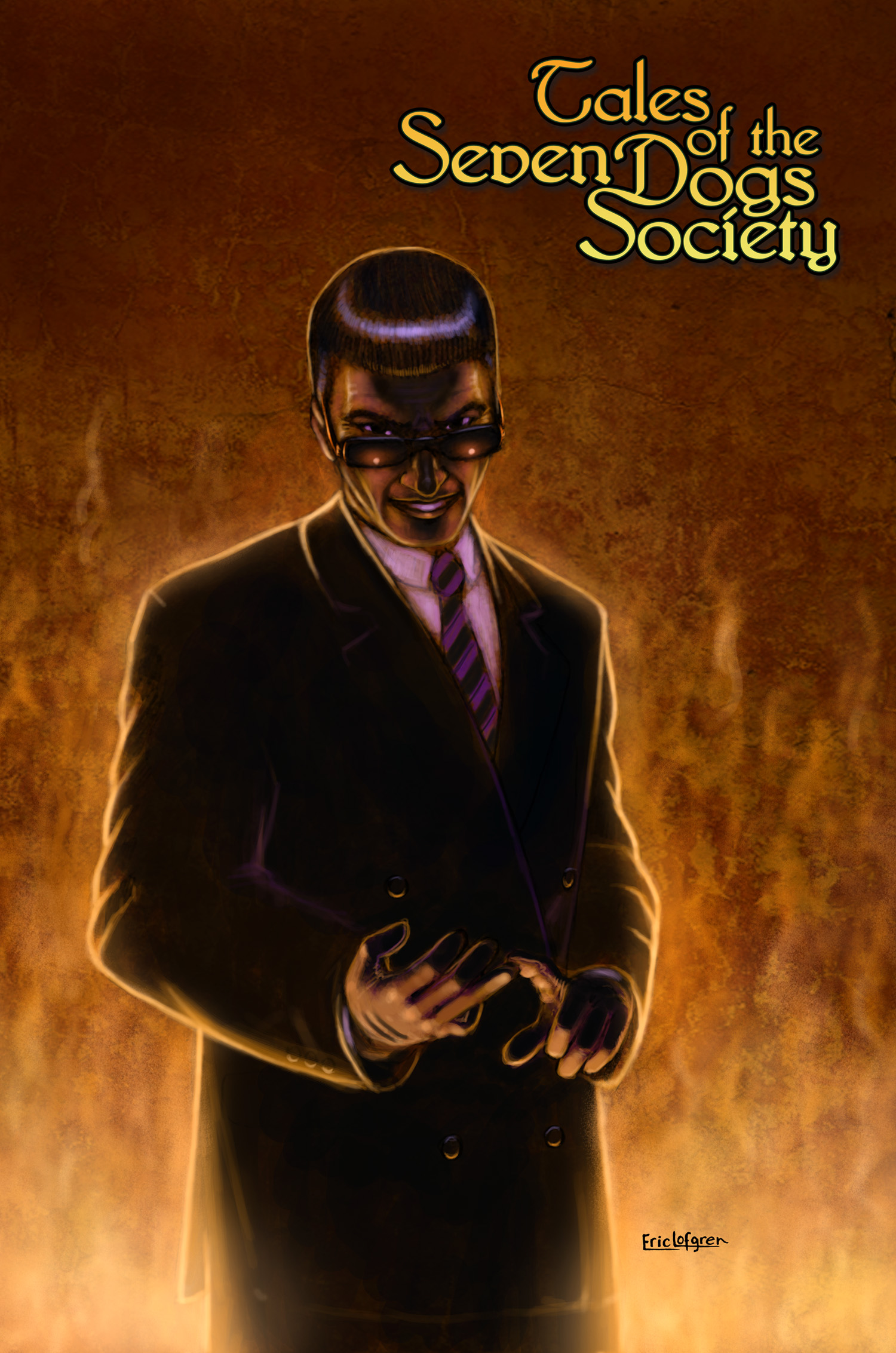Tales of the Seven Dogs Society Fiction Review
Posted on February 5, 2009 by Flames
Tales of the Seven Dogs Society is a collection of three short stories framed against the background of the Seven Dogs Society, the player group of Abstract Nova’s Aletheia RPG. If the game is unknown to you, I recommend taking a look at the reviews found at rpg.net, flamesrising.com and abstractnova.com, as they will reveal a great deal about the setting which I cannot go into here. The cover is one of Eric Lofgren’s typical pieces, showing an evil-looking man leering at the reader, with flames rising around him.
The short stories give some useful ideas for an Aletheia GM, and (if you don’t mind the spoilers), for some good ideas on how a PC can be integrated into the team – Matt McElroy’s narrator, a former private eye, for example, is recruited after getting a name for himself as a missing persons expert on ‘weird’ cases. The stories also offer some useful suggestions as to how to run an investigation – from the point of view of the GM and the players alike. The three stories offer different takes on the Seven Dogs Society, and possible ‘what-comes-after’ takes on the future of the setting. The GM could easily mine all three for scenario / campaign ideas, but the stories are well-written enough to appeal to the casual reader too.
The book starts with a brief description of the game, but the casual reader can easily pick up on the setting and theme as they read, as notable characters, events and the Society itself are ably described in the stories. Each of the tales revolves around different SDS groups; the stories form independent vignettes of possible player groups, rather than following one particular group through a campaign. Matt’s contribution describes the setting (including the strange house where the players make their new home), the premise of the game, and the main players, and would be ideal as an introduction to the game; a GM could easily create stats for the members of the SDS and have his players run the heroes of the story, with decent enough backgrounds for each of them. Matt introduces some of the areas where players need to be a bit cagey – particularly around reporters and police – as the SDS needs to keep a low profile, and the story as a whole gives quite a bit of useful advice to players and GMs alike for running a game of Aletheia.
The second tale, Jim Johnson’s contribution, deals with the entrance of a new member to the SDS, and deals partly with specializations of the group; an ideal party would have members with a diverse array of backgrounds and skills, from all walks of life with particular roles to play. Again, this story would be appropriate for a newly starting group, so that the players would gain an understanding of role specialization in the group. There’s also a pretty good description of how a field research team might operate when collecting evidence. In addition, the tale gives a decent enough description of the SDS’ HQ. It also, unfortunately, gives away a few details of the metaplot and the fate of one of the society’s previous incarnations.
The third tale, by Monica Valentinelli, is a bit of a departure from the others, covering the pre-SDS life of two subsequent members, twins, as well as their eventual participation as members. As well as the usual description of the house and the SDS, this tale also includes the Usher Codex, the weird document at the heart of the metaplot. The tale itself is written in two parts, one from the viewpoint of each twin, and the remainder of the SDS members are absent. It also reveals quite a bit more about the metaplot (at least, the Codex’s place in it) than the other two tales.
The writing isn’t the greatest in the world, but at the least it’s of the same standard as most SF / gaming-based writing. There are a few points that an editor should have recommended changes – for example, I can understand the butler bringing the new entrant a cold plate since he’d just arrived, having been traveling all day, but would he really have provided such for everyone in the house, when he’s just announced that dinner would be in an hour? Thankfully, however, there are few typos (“He’d dead” being the most noticeable). As a whole, the book is an easy read, and would even be a good introduction to the game for someone who had never played it, though I would caution that the tales each include several spoilers that are best discovered in play rather than revealed beforehand.
On the whole, as a stand-alone work of speculative fiction, I’d rate it as being pretty average (though I should probably point out that I don’t tend to rate fantasy / SF books very highly), but I’d recommend it as giving some good examples of investigative scenes, interactions and parts of the metaplot and general weirdness of the setting. The book is not a lavishly-produced work of art by any means, but the content is certainly worth reading as a mine for ideas, for both players and GMs.
Style: 3 / 5
Substance: 4 / 5
Review by Nick Lemming



